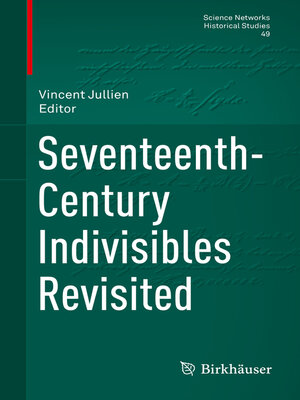Seventeenth-Century Indivisibles Revisited
ebook ∣ Science Networks. Historical Studies
By Vincent Jullien

Sign up to save your library
With an OverDrive account, you can save your favorite libraries for at-a-glance information about availability. Find out more about OverDrive accounts.
Find this title in Libby, the library reading app by OverDrive.



Search for a digital library with this title
Title found at these libraries:
| Loading... |
The tremendous success of indivisibles methods in geometry in the seventeenth century, responds to a vast project: installation of infinity in mathematics. The pathways by the authors are very diverse, as are the characterizations of indivisibles, but there are significant factors of unity between the various doctrines of indivisible; the permanence of the language used by all authors is the strongest sign.
These efforts do not lead to the stabilization of a mathematical theory (with principles or axioms, theorems respecting these first statements, followed by applications to a set of geometric situations), one must nevertheless admire the magnitude of the results obtained by these methods and highlights the rich relationships between them and integral calculus.
The present book aims to be exhaustive since it analyzes the works of all major inventors of methods of indivisibles during the seventeenth century, from Kepler to Leibniz. It takes into account the rich existingliterature usually devoted to a single author. This book results from the joint work of a team of specialists able to browse through this entire important episode in the history of mathematics and to comment it.
The list of authors involved in indivisibles´ field is probably sufficient to realize the richness of this attempt; one meets Kepler, Cavalieri, Galileo, Torricelli, Gregoire de Saint Vincent, Descartes, Roberval, Pascal, Tacquet, Lalouvère, Guldin, Barrow, Mengoli, Wallis, Leibniz, Newton.






